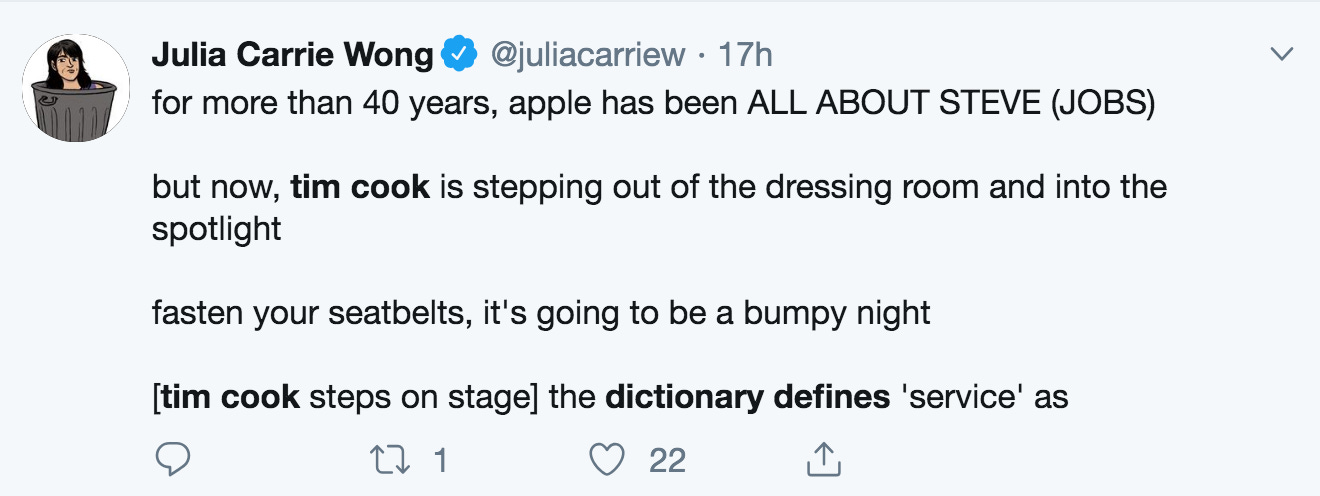Hi Friends,
Maybe you heard about some stuff Apple released yesterday. (ed: yawn.) You may have also heard that Tim Cook turned his keynote into you go-to intro to all your 9th grade 5-paragraph essays:

I mean. Really, Tim Cook? The dictionary defines?
I love dictionaries. Some of my favorite people have actually made dictionaries. But that construction is some hackneyed, boring, canned language shit. What’s canned language? It’s a phrase you automatically write because millions of writers have written it before you. It’s not exactly a cliche, but it can be. It’s not exactly a proverb or a saying, rooted in oral history, mythology, religion, or the like. It’s just the easy stuff that rolls off your fingertips and makes your writing dull, dull, dull.
To me, canned language is the mark of a writer who doesn’t have sharp editing skills. It’s the kind of thing you write in a first draft, and take out in the first edit. It’s not illegal. It’s not incorrect or bad grammar. It’s just an unoriginal or uninspired way to express yourself, and if you’re trying to persuade readers to follow your story, sign you up as a client, buy your book, believe your thesis, agree with you, canned language is not the way to do it.
In a query letter, or any other type of writing I’m evaluating, the most common one I see is trials and tribulations. It’s a nice sounding phrase. The alliteration is pleasing; that trib is a fun sound to make. It practically writes itself, as a phrase, and when you’re struggling with a sentence, a letter, a paragraph, any little thing helps, amirite?
You are right, but you still take it out on your first pass edit. It is so familiar it’s become meaningless. What trials? When do you use tribulation in any other context? This is a key example of telling, too, instead of showing. Say he lost his job. Say they broke up. Say the dog got lost. Be specific.
Next: couldn’t help but/can’t help but. This might just be a pet peeve of mine, but I think it still applies. I’ve thought about keeping a tally, but it is rarely a day where I don’t see this phrase in some piece of writing, online, on submission, in a book. I sometimes write it myself! And then I delete it, because I CAN help but write this too too too familiar phrase.
Again, these aren’t necessarily cliches. I think cliches should be used with great prejudice, only when to take them out would obscure meaning or make the story worse. 99% of the time, you can take cliches out of everything and make your writing better. I have been known to deploy a god willing and the creek don’t rise, but I’m Southern, and again, only when absolutely necessary.
The bottom line is, if someone can finish your sentence for you, that’s bad. If the reader can predict what you’re going to say, you’ve bored them, not charmed them, not persuaded them. When the reader feels smarter than the writer, the reader checks out and finds something else to read. And that can be why your pitch doesn’t get accepted, your query gets a form rejection, your book doesn’t sell.
Will one phrase is a sea of good writing doom you? No. But too much and you’re showing the reader you’re not aware of the affect of your writing and that your own editing skills didn’t catch this. Writing is as much taking words out as putting words in. Make sure all your words count.
Don’t forget: subscribers get Q&A Thursdays! Send me your questions and I’ll provide answers. Tell your friends!
Best,
Kate
EDIT: Fabulous author and amazing historian Katie Kennedy just informed me that my previously-thought-to-be-charming “god willing and the creek don’t rise” is actually not a cutesy thing Southerners say about impending rising water, but actually racist! It’s a quote from Benjamin Hawkins, a U.S. “Indian Agent” in a letter to Thomas Jefferson. Hawkins was telling Jefferson that he’d be in Washington soon, "Good Lord willing and the Creek don't rise,"i.e. the Creek Nation, not a body of water. Striking that “cute” phrase from my lexicon ASAP. Read Katie’s books. She’s fantastic.


